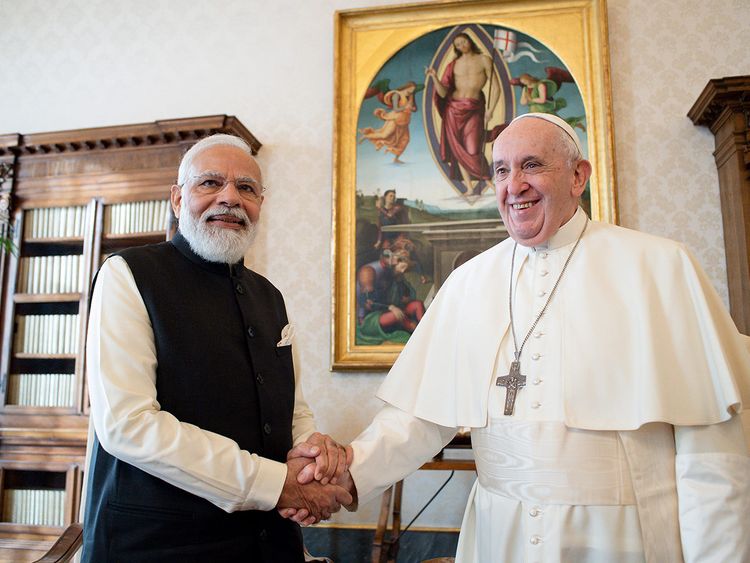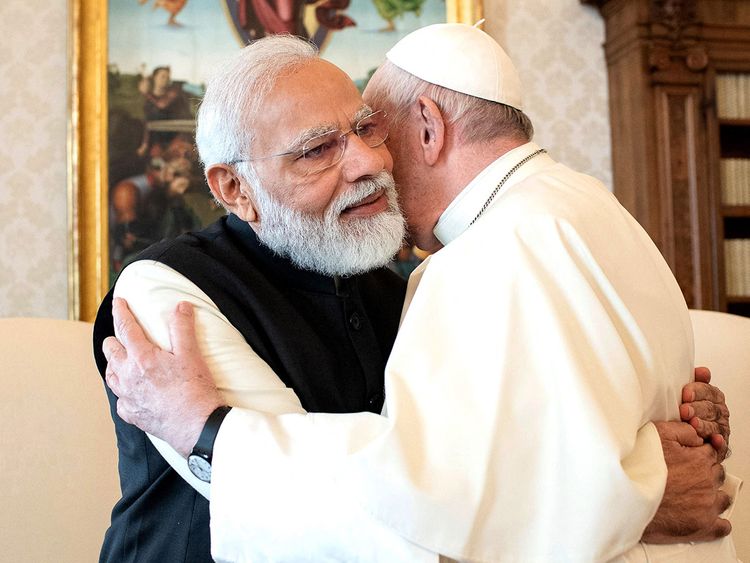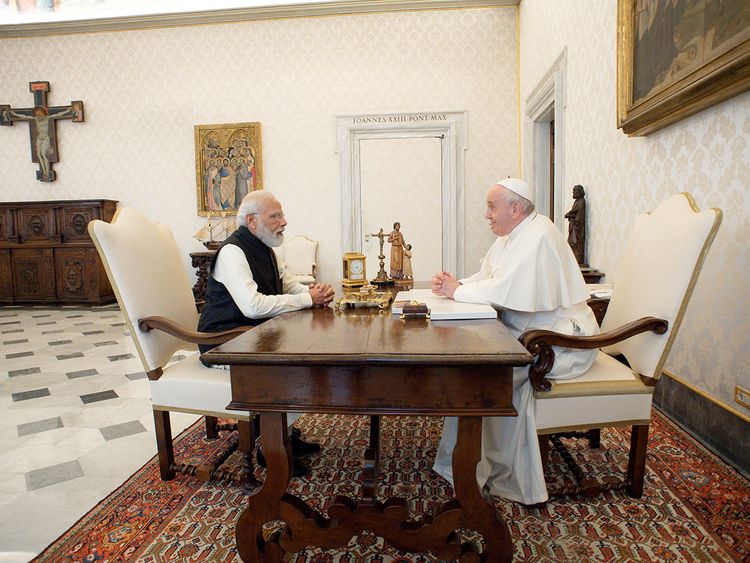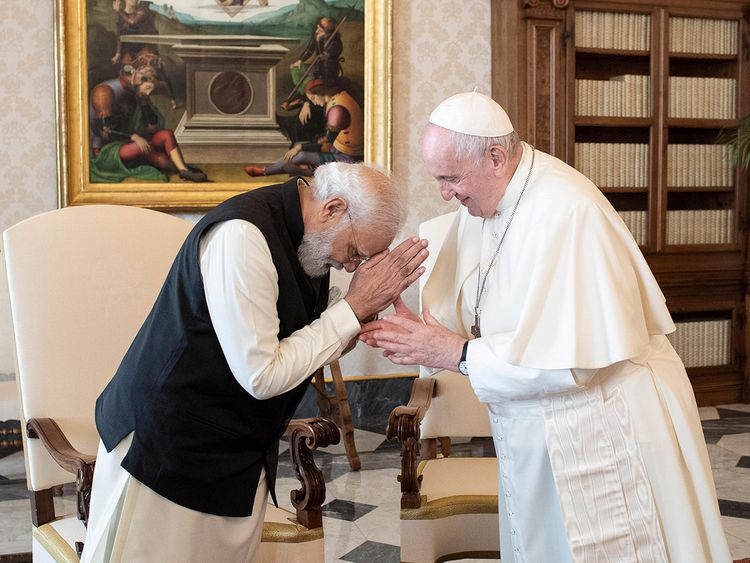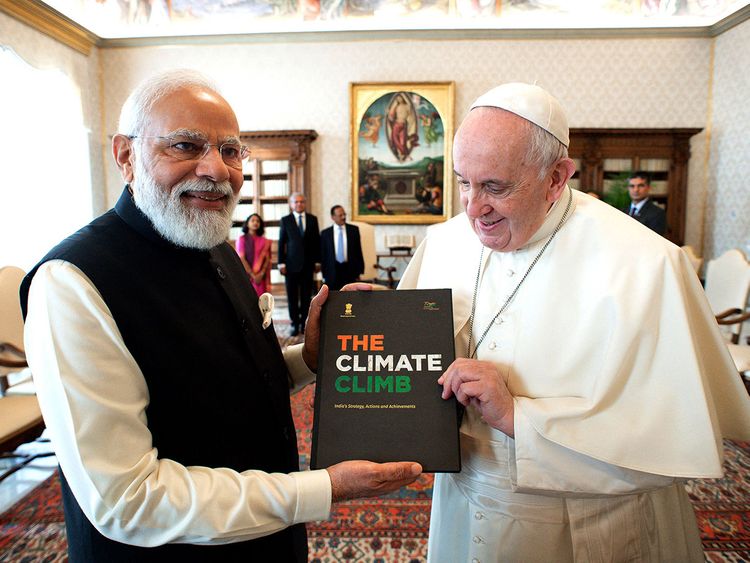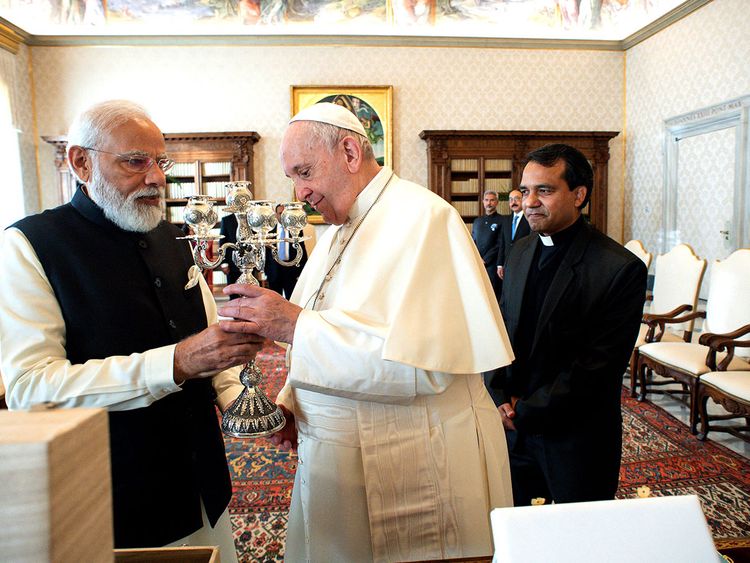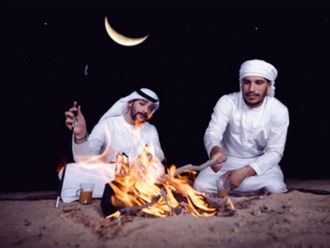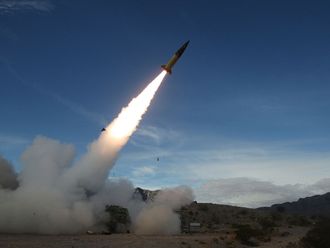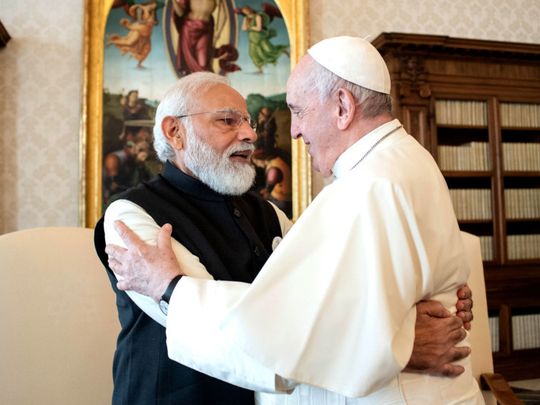
Rome: Prime Minister Narendra Modi invited Pope Francis to visit India during a “very warm” meeting at the Vatican City which lasted for an hour on Saturday, sources said.
The meeting was scheduled only for 20 minutes however, it went on for an hour, sources said. Modi and the Pope discussed a wide range of issues aimed at making our planet better such as fighting climate change and removing poverty.
It is the first-ever one-to-one meeting between Prime Minister Modi and Pope Francis, the head of the Catholic Church.
Modi is also the first Indian Prime Minister Francis has met since becoming Pope in 2013.
It may be recalled that the last Papal visit happened in 1999 when Atal Bihari Vajpayee was the Prime Minister and Pope John Paul II came.
The last pope to visit India was John Paul II, who went to New Delhi in 1999 to issue a papal document on the Church in Asia.
In June 2000, late Prime Minister Atal Bihari Vajpayee had last visited the Vatican and met the then Pope John Paul II.
India and The Holy See have friendly relations dating back to the establishment of diplomatic relations in 1948.
A Vatican statement gave no details of the meeting between Francis and Modi, who is in Rome to attend the G20 summit of the world’s richest countries.
There are about 20 million Roman Catholics in India, about 1.5% of the population of 1.3 billion, second largest Catholic population in Asia.
Some 80% of India’s people are Hindu, according to UCA News, which specialises in the Catholic Church in Asia. -- Agencies
Now it is during Modi’s term that the Pope has been invited to visit India.
Meanwhile, ahead of Diwali, The Vatican has greeted the Hindu community, expressing hope that interreligious solidarity can bring light in people’s lives amid despair and uncertainty arising from the challenges posed by the pandemic.
The Pontifical Council for Interreligious Dialogue sent “its most cordial greetings” on Friday to all Hindus on the occasion of Diwali, also known as the festival of lights, on the theme “Christians and Hindus: Together bringing light into people’s lives in times of despair.”
Diwali will be celebrated on November 4 this year.
“May the observance of this feast even in the midst of anxiety and uncertainty arising from the present pandemic, and its resultant worldwide crises, light up your lives, homes and communities with the hope for a better future,” it said in the statement.
The scars of the first and second waves of the pandemic, which upended the lives and livelihood of people, has left the people with a sense of resignation, despair and despondency and “we both Christians and Hindus can bring the light of hope in people’s lives in such challenging times,” it said.
“Bringing light together in people’s lives through interreligious solidarity also validates the usefulness and resourcefulness of religious traditions in society,” it said.
Noting that religious traditions, as repositories of wisdom, in times of crisis, have the power of lifting sagging spirits, the Pontifical Council said that they also have the capacity to help individuals and communities to reset their life’s compass with hope, with their gaze fixed beyond their present despair.
It called on the religious and community leaders to nurture the spirit of fraternity among their followers with a view to helping them walk and work together with the people of other religious traditions, most especially during crisis and calamity of every kind.
“The power of solidarity unleashed in alleviating the suffering and assisting the needy, more so with an interreligious character and responsibility, gives visibility to the light of hope by putting in evidence the response which adherents of all religious traditions are called upon to make in times of despair and darkness,” the statement said.
The Pontifical Council said that greater awareness about one another, interdependence and working solidarity can help the world emerge out of every crisis better.
“Even the pressing global issues that threaten to disrupt the harmony between nature and people and the harmonious co-existence of people such as climate change, religious fundamentalism, terrorism, hyper nationalism, xenophobia can be effectively addressed since these are concerns that affect us all,” it said.
Modi departed from the Vatican City after his meeting with Pope Francis on Saturday ahead of the G20. He was accompanied by National Security Advisor (NSA) Ajit Doval and External Affairs Minister (EAM) Dr S Jaishankar.
The Vatican is a city-state surrounded by Rome and is the headquarters of the Roman Catholic Church.
Prime Minister arrived in Italy on Friday to participate in the two-day G20 Summit. Modi will participate in the G20 opening session on Global Economy and Global Health today.
He is also scheduled to have a meeting with French President Emmanuel Macron and a meeting with the President of Indonesia Joko Widodo. Modi is expected to have a meeting with Singapore PM Lee Hosein Loong as well.
In the evening, PM is scheduled to arrive at Terme di Diocleziano for a cultural programme. Later, there is a dinner planned for G20 leaders and partner countries.
While briefing about the Prime Minister’s Italy visit, Foreign Secretary Harsh Vardhan Shringla on Friday said that Modi will discuss the economic situation, COVID-19 pandemic, sustainable development and climate change with G20 leaders.
On Friday, Modi met with top European Union leaders and Italian Prime Minister Mario Draghi. They congratulated Prime Minister Modi for India’s excellent progress on the COVID-19 vaccination.
Prime Minister also interacted with members of the Indian community-based in Italy. PM Modi will be in the capital city of Italy till October 31.


